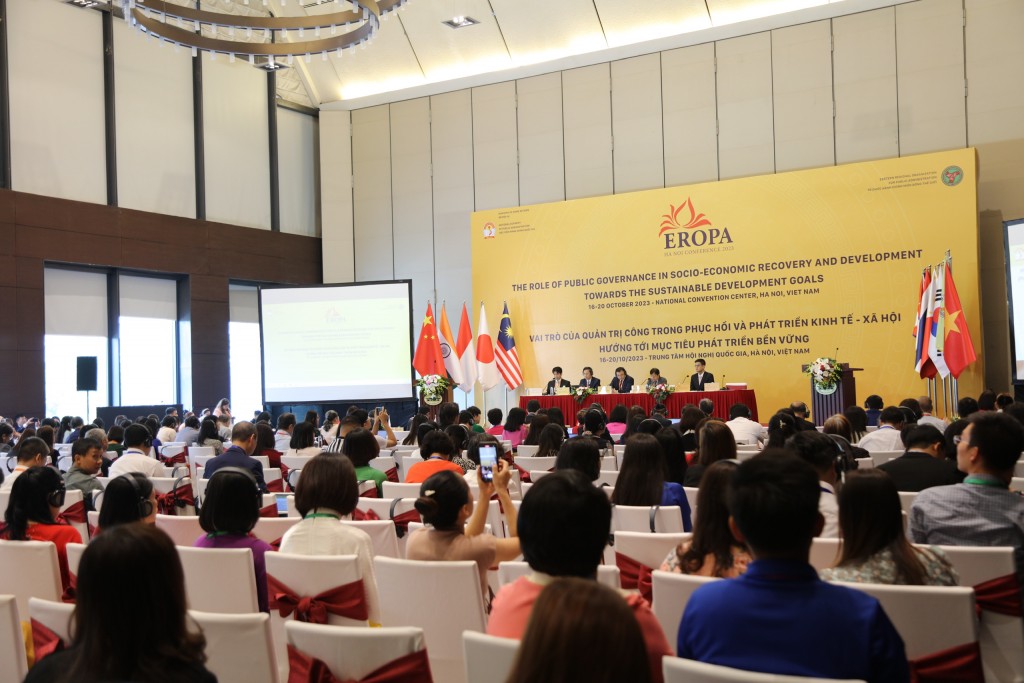On the morning of October 19, at the National Convention Center, Conference Plenary IV of the 2023 EROPA Conference took place with presentations from speakers from the Philippines, Japan, and Viet Nam. Dr. Alex Brillantes, Secretary General of EROPA and Assoc. Prof. Dr. Nguyen Quoc Suu, Vice President of the National Academy of Public Administration, co-chaired the session.

Hon. Dakila Carlo Cua, President of the Union of Local Authorities of the Philippines, and Governor, Quirino Province, delivering a presentation at the plenary session.
Hon. Dakila Carlo Cua, President of the Union of Local Authorities of the Philippines, and Governor, Quirino Province, spoke at the working session with the presentation “Leveraging provincial governments and governors as middle managers in the attainment of national security goals”. He first mentioned the 17 sustainable development goals (SDG) set by the United Nations (no poverty, zero hunger, good health and well-being, quality education, gender equality, clean water and sanitation; climate action; life below water; life on land…).
The Philippine government has recognized the urgency of this global mission and has actively participated in the development of the Philippines’ progress SDG Index. However, currently, the Philippines has only successfully achieved one SDG.
He emphasized that the Covid-19 pandemic has dealt a heavy blow to the Philippines’ hard-earned achievements and that there are still significant obstacles in achieving these important SDGs. Because of this, the Philippines currently ranks 95th out of 163 countries on the Sustainable Development Report. Although the Philippines has made progress towards the SDGs, challenges remain, especially in poverty reduction, gender equality, access to clean water and sanitation, affordable and clean energy, sustainable cities and communities, and partnerships for progress. This challenge may not be unique to the Philippines. In fact, during the 2023 ASEAN Mayors Forum organized by the United Cities and Local Governments in August 2023, there was a consensus among local leaders from various ASEAN countries that attaining the SDG by 2030 is highly unlikely.
According to him, in order for governments to achieve all 17 SDGs, the Philippines needs to localize their approach and empower local government units.
The three pillars of Philippine national security proposed are: (1) Upholding the unity of the Philippines, its democratic principles, and social institutions; (2) Ensuring the state’s security and safeguarding its sovereignty, territorial integrity, and institutions; (3) Safeguarding properties, infrastructure, and the well-being of the people against threats, both domestic and foreign.
At Conference Plenary IV, Prof. Dr. Masao Kikuchi, Chair of EROPA Future Plans and Programs Committee, Director of Meiji University International Education Center, Professor of Public Policy and Management, Meiji University, Tokyo, Japan, delivered a presentation on the topic: “Sustainability and local governance in Japan: Some reflections and lessons”. There are five main sections in his presentation: (1) Local government system at a glance; (2) Municipal mergers in Japan; (3) Inter-municipal cooperation in Japan; (4) Local civil service system and staff loans in Japan; (5) Challenges on sustainability in local governance in Japan.
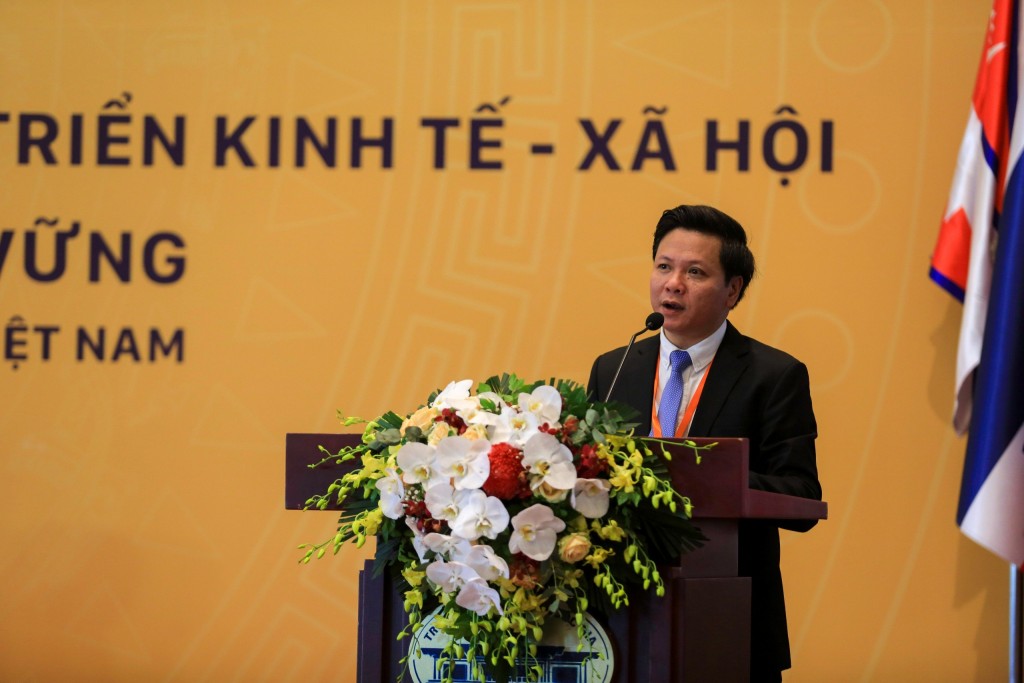
Mr. Phan Trung Tuan, Director General, Department of Local Government, Ministry of Home Affairs, presenting at the plenary session.
Mr. Phan Trung Tuan, Director General, Department of Local Government, Ministry of Home Affairs, shared with the Conference the importance of building local governments to ensure good governance and promote sustainable development in Viet Nam. He affirmed that local governments in Viet Nam play an important role in promoting economic and social development while ensuring security and order at the local level. To improve the effectiveness of this work, a number of policy recommendations need to be applied as follows:
First, training and capacity building for local government: to meet the requirements of economic management and development, it is necessary to invest in training and capacity building for local government officials. This may include strengthening management capabilities, leadership skills, and knowledge of socio-economic development.
Second, strengthening the monitoring and supervision of policy implementation at the local level to ensure transparency, fairness, and the effectiveness of policy decisions.
Third, encouraging investment and supporting businesses: local governments need to create favorable conditions for local businesses and attract foreign investment. This could include improving the business environment, reducing import fees and taxes, and creating policies to support small and medium-sized enterprises.
Fourth, local governments need to increase interaction and collaboration with the community and listen to and respond to people’s opinions and aspirations. This requires strengthening the practice of democracy, building effective communication channels, and creating opportunities for citizens to participate in policy decisions.
Fifth, ensuring the formulation of a sustainable development policy system through a system of sustainable development goals and the creation of policies to support environmental protection, sustainable resource use, and the promotion of circular and green economies.
These recommendations aim to improve the effectiveness and benefits of local government in Viet Nam, thereby aiming for good governance and ensuring sustainable development for the country.
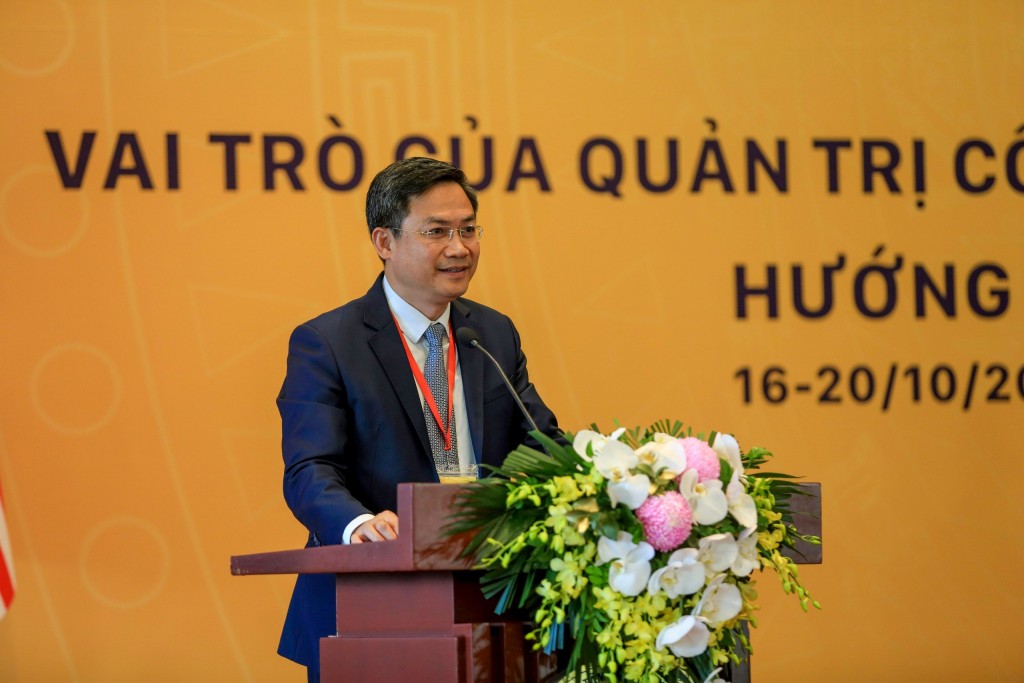
Mr. Ha Minh Hai, Vice Chairman of People’s Committee of Ha Noi City, presenting at the plenary session.
Mr. Ha Minh Hai, Vice Chairman of People’s Committee of Ha Noi City, delivered a presentation on various issues related to local governance innovations in Vietnam today. He provided an overview of the achievements and limitations of implementing the urban government model in three big cities (Ha Noi, Ho Chi Minh City, and Da Nang). Based on this, he outlined some key areas of focus to improve the effectiveness of local governance: (1) Enhancing institutions for regional linkage planning. Regional linkage is a relatively new concept, lacking cohesion in planning and clear direction. Presently, there are six key economic planning regions in Viet Nam driven by the government, alongside detailed economic development plans for each locality; (2) Comprehensive planning of administrative units, ensuring streamlining, reducing the number of units while increasing their scale and creating room for sustainable development. This includes defining the organizational model, functions, and authority of administrative units to align with the new scale of administrative units; (3) Completing the organizational structure and apparatus of administrative units while strengthening and promoting decentralization and transfer of power to local governments on the basis of properly determining the functions, tasks and powers of agencies and administrative levels at all levels, differentiating between urban, rural, and island areas; (4) Attracting and cultivating public sector talent, building a comprehensive and effective mechanism.

Assoc. Prof. Dr. Nguyen Thi Hong Hai, Dean of the Faculty of Administrative Sciences, National Academy of Public Administration, presenting the policy recommendations for Viet Nam.
Assoc. Prof. Dr. Nguyen Thi Hong Hai, Dean of the Faculty of Administrative Sciences, National Academy of Public Administration, discussed human resource reform in the public sector. According to her, this reform needs to focus on two main groups: talented individuals and leaders, especially at the highest levels, because they are the ones who can bring about change and innovation. Talented individuals need to be identified, placed in appropriate positions, and undergo long-term training and development.
In Viet Nam, the National Strategy for talent attraction and retention has been issued. Many ministries and localities have boldly issued policies to attract talent, often referred to as “red carpet policies”. However, in practice, these policies have not yielded the expected results. It is necessary to establish a policy framework for this group, which not only focuses on talent attraction but also covers recruitment, training, utilization, appointment, rewards, and welfare regimes. To discover talent, there is a need for measurement and evaluation of their contributions, which will help in developing suitable talent development plans. Therefore, an assessment tool should be developed to assess the contributions of current employees and their potential, identifying those who can benefit the organization.
Assoc. Prof. Dr. Nguyen Thi Hong Hai pointed out that the evaluation criteria for the Viet Nam Provincial Governance and Public Administration Performance Index (PAPI) have been implemented in recent years, reflecting some aspects of good governance; however, there are still important criteria missing. Therefore, to promote reform and improvement of local government in Viet Nam towards good governance, additional criteria should be included in the assessment system, including transparency of information, responsiveness, transfer of power to lower levels, and the level of digital transformation.
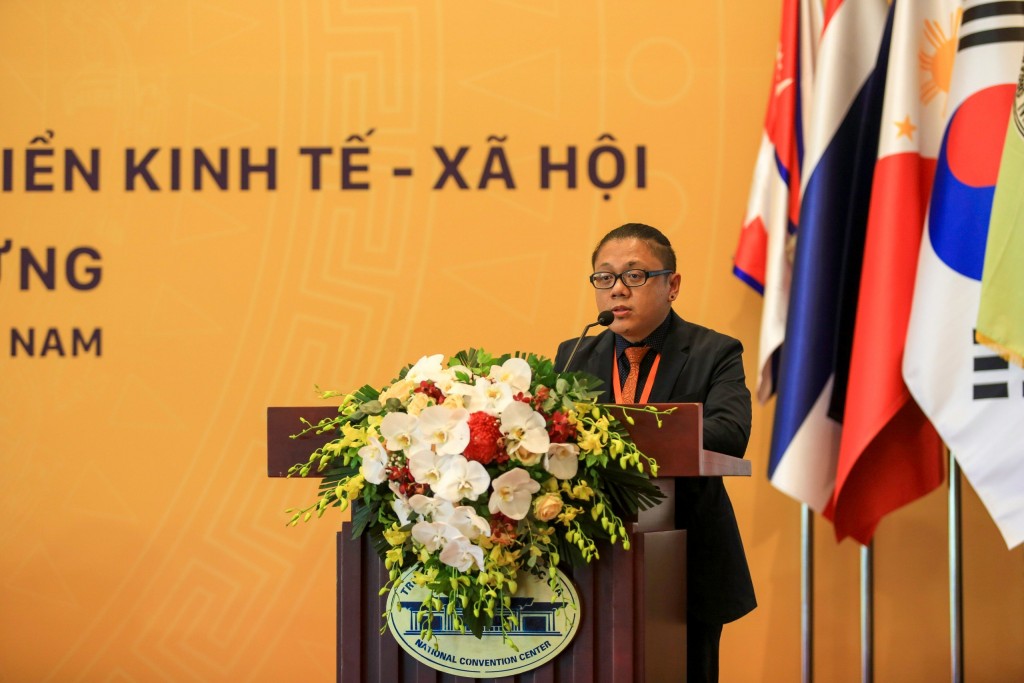
Assoc. Prof. Dr. Kristoffer Berse, Deputy Secretary General of EROPA, presenting the policy recommendation session.
Assoc. Prof. Dr. Kristoffer Berse, Deputy Secretary General of EROPA, proposed several solutions for local governance renewal to achieve sustainable development goals, including:
First, strengthening human resource development, ensuring the recruitment and retention of the most talented individuals in the public sector.
Second, accelerating the transition to digital government at both central and local levels, including integrated hardware and software systems, with a strong emphasis on developing “human software”.
Third, improving local government capacity in supervision, coordination, monitoring, and evaluation to ensure strategic coordination and effectiveness and efficiency of operations at the local level.
Fourth, further strengthening transparency and accountability mechanisms, especially with respect to stakeholder engagement and media relations.
Fifth, aligning local governance needs with local budget development and autonomy.
Sixth, promoting local socio-economic development through comprehensive planning based on the “entrepreneurship spirit” as well as specific local needs and strengths, implemented through interdisciplinary and cross-sectoral approaches, and taking regional advantages into account.
Seventh, promoting innovation to strengthen local government decentralization, taking local contexts into account and learning from successful and unsuccessful experiences from other countries.
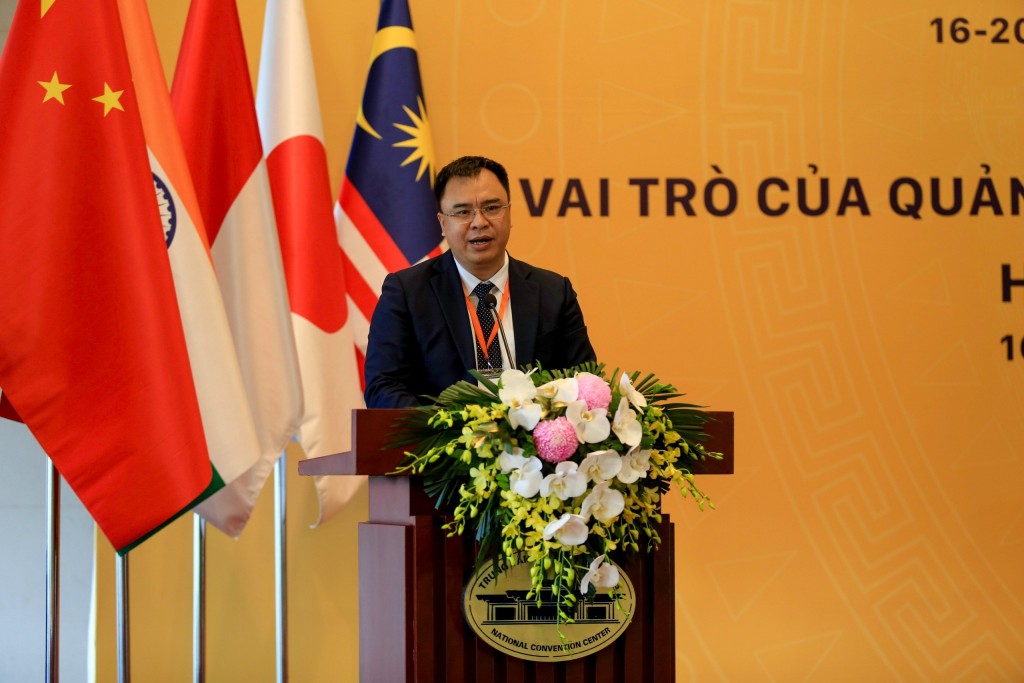
Assoc. Prof. Dr. Nguyen Quoc Suu, Vice President of the National Academy of Public Administration, presenting at the Conference Plenary.
Assoc. Prof. Dr. Nguyen Quoc Suu, Vice President of the National Academy of Public Administration, outlined four reference values: (1) focusing on human resource development in the public sector, including the activities of local governments ; (2) improving ethical standards and accountability of agencies, organizations, and individuals in performing public services; (3) implementing solutions to strengthen internal control in local government operations in order to promote their operational efficiency; (4) strengthening decentralization to local governments as well as enhancing coordination in local governance to contribute to the innovation of public administration; (5) formulating specific plans based on local strengths, involving interdisciplinary and inter-regional, to promote socio-economic development of each locality.
Assoc. Prof. Dr. Nguyen Quoc Suu also gave some implications for Viet Nam:
First, in the medium and long term, local governance needs to be associated with the development and budget autonomy of localities. In the medium-term vision, local governance in Viet Nam needs to be associated with local development, allowing localities to have financial autonomy while continuing to strengthen the quality of governance activities, as indicated by research conducted by scholars.
Second, it is necessary to revise the budget regulations of local governments to make local governance more like a business. Accordingly, budgets from the current year that remain unused should be rolled over to the following fiscal year to avoid last-minute spending to prevent reductions in the next year’s budget by higher-level authorities. At the same time, the head of the local government is the representative of the public legal entity and the account holder, responsible for revenue and expenditure in the budget according to law.
Third, increasing the participation of multi-subjects in local governance is crucial. People’s participation in local governance clearly reflects the thinking and actions of local governments in considering people as subjects participating in creating economic, cultural and social values of the localities. This ensures the successful implementation of the principle “People know, people discuss, people do, people inspect, people supervise, people benefit”. It is essential to fully promote the role of People’s Councils at all levels in representing the local population; the monitoring and social criticism role of the Viet Nam Fatherland Front and its member organizations; the role of the press in providing accurate information on the national and global situation that aligns with the interests of the country and the people.
Fourth, implementing digital transformation is associated with building e-government and digital government at the local level. Local governments at all levels must develop projects, programs, and plans to effectively deploy and implement digital transformation goals, perspectives, tasks, and solutions, build and regularly update and supplement a set of assessment criteria for digital transformation, including assessment criteria for digital government, digital economy, and digital society of the country, each industry, and each locality on the basis of inheritance and development of the set of e-government evaluation indicators; develop and integrate evaluation criteria for digital transformation into the Provincial Competitiveness Index (PCI Index), Public Administration Reform Index (PAR Index) and Information and Communications Technology Index (ICT Index), a set of indicators to evaluate the level of information technology application associated with the National Digital Transformation Program to 2025, with an orientation towards 2030…
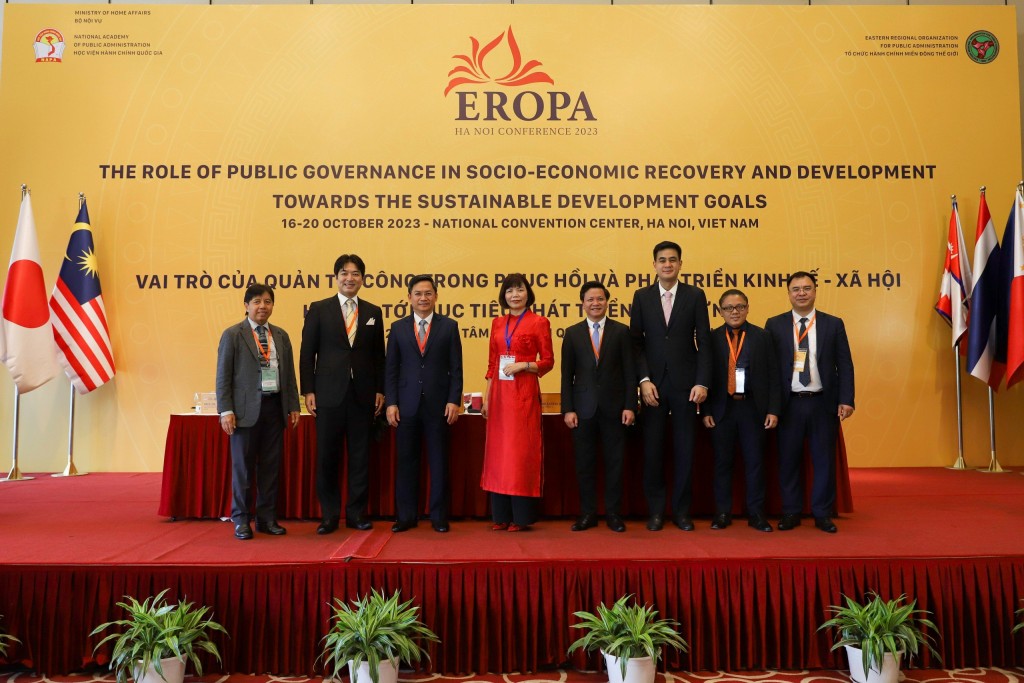
Plenary speakers being awarded Certificates of recognition for their contributions to the Conference Plenary IV.



